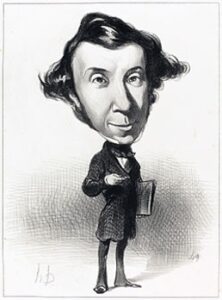An existential risk, in general, is one that could cause the collapse of human civilization, such as nuclear war. An existential risk to democracy is one that could bring about the collapse of individual liberty, such as fascism. This is the theme of The New Republic magazine cover that morphs Donald Trump’s face into Hitler’s. It is, also, the theme of numerous politicians and cable news commentators who have called Trump an existential threat to our American democracy and called for him to be stopped at all costs. Twenty-year-old Thomas Matthew Crooks gave up his own life to try.
In like manner, many politicians and cable news commentators have asserted Joe Biden is corrupt in his personal life and, as president, he has “weaponized” his Justice Department against his political opponents and must be ousted from office. He has been demonized as “Crooked Joe” and vilified as a threat to our democracy due to his advancing age. Although many of us also feel Father Time creeping around.
Some supporters of Biden and some supporters of Trump are indistinguishable in their vociferously clanging brass, or as Ecclesiastes, Ch. 9, v. 17 might say their “… shouting of ruler(s) among fools.” What we need instead are, “The words of the wise heard in quiet ….”
But America may have been blessed with the curse of a near miss on July 13, 2024 when former President Trump somehow survived an assassination attempt and gave both Trump and Biden and their supporters one of life’s greatest and rarest gifts, another chance. And America, itself, would be the beneficiary if we do not squander it.
Biden and Trump are neither one dogs but they might want to reflect on some more wisdom from Ecclesiastes, “But he who is joined with all the living has hope, for a living dog is better than a dead lion,” Ch. 9, v. 4. In other words, even though both men are old they still have the opportunity to go out like lions if they choose wise leadership over foolish rhetoric and actions. Instead of speaking and acting like petulant children they should follow First Corinthians, Ch. 13, v. 11, “When I was a child, I spoke like a child, I thought like a child, I reasoned like a child; when I became a man, I gave up childish ways.” And all it took was one near miss for both of them to have the chance to finally grow up.
Former President Trump is the one who was shot and survived, but Biden is intrinsically entwined by circumstances with Trump’s fate and fortune. Much like many paired adversaries, the fate of one is the fate of both. And Biden is being “shot at” by his own Democrat Party that is pressuring him to simply give up “for the good of the country.” Of course, if instead of standing up and fighting Biden steps aside, whoever replaces him will come from the ranks of those who have also ascribed to the assertions that Trump is an existential threat. Regardless, for now both Biden and Trump are the candidates and just as all of us, they have had that ever present gnawing thought in the middle of the night, “Why didn’t I do or say that differently? Oh, how I wish I had the chance to change what I said or did.” Well, Trump and Biden do now have that chance. They both, even as elderly public servants, have been given the golden gift of an unexpected chance to re-make their personal and public personas. They could take their guidance from that great philosopher, William Shakespeare, whose Prince Hal put off juvenile behavior and clothed himself in royal responsibility. As King Henry, the onetime feckless rogue made himself into a great leader of England upon his father’s death and astonished his people:
“… he (Prince Hal) may be more wondered at by breaking through the foul and ugly mists of vapors that did seem to strangle him.
”Henry IV, Part I, scene II.
Of course, one person will win in November, but whoever the candidates may be they both can rise above the current ad hominem viciousness and provide our country with hope, guidance, wisdom and leadership. Most of us will not get a reprieve from life for our sins and bad judgments. But occasionally life does shoot-at-someone-and miss. Say a cancer diagnosis that turns out to take years instead of days or an unexpected heart attack that we survive. How we respond determines how we expend the rest of our lives and how our family and friends evaluate whether we are honorable in our second chance behavior.
When it comes to Donald and Joe, they now, even at or near 80, have the totally unexpected chance to modify their behavior, and in doing so, help save their country. Such a rare treasure should not be squandered on the shoals of egotistical ambition. Perhaps when each of them awakes in the middle of the night now they will say to themselves, “Thank you for this once in a life-time totally unexpected opportunity.” Then each might become the leader even their opponent did not expect.


